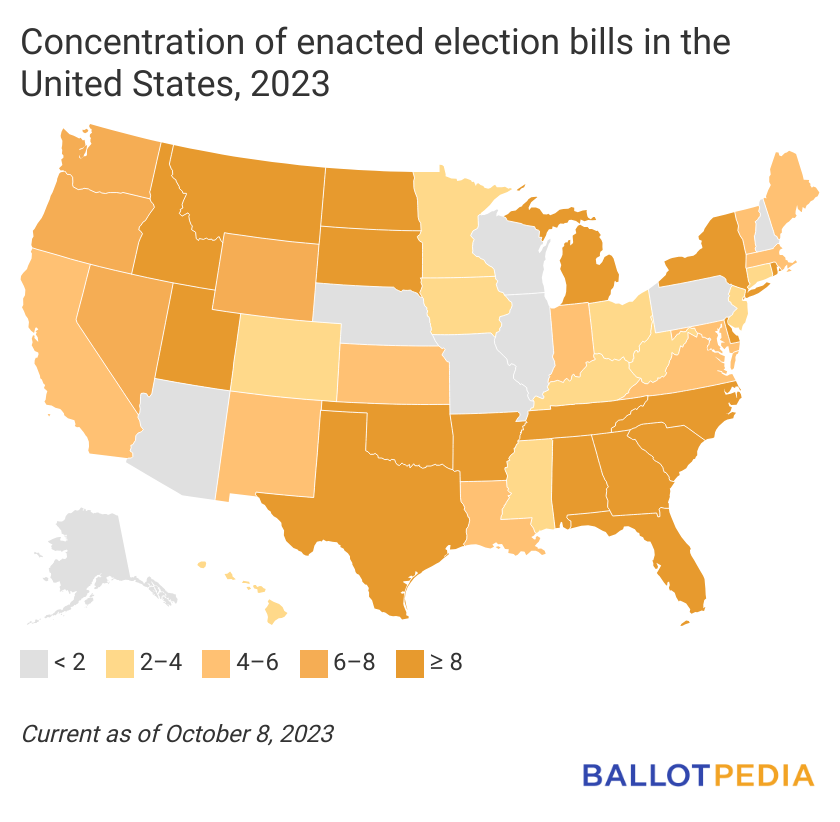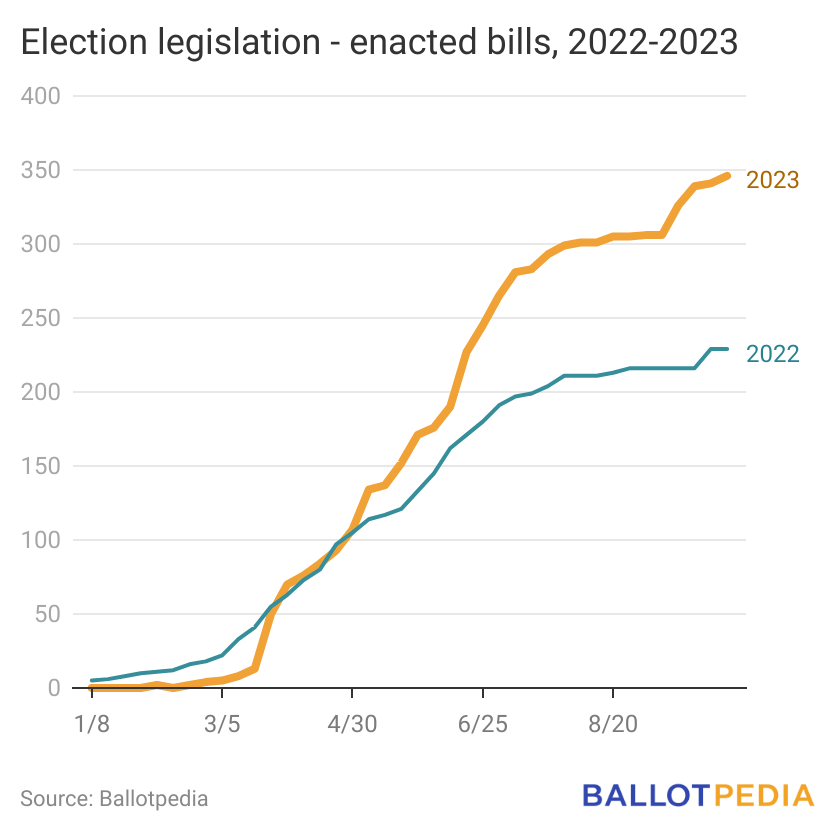As of Oct. 8, members of the General Assembly of North Carolina, which includes the North Carolina House of Representatives and the North Carolina State Senate, have passed 17 bills related to election administration since the beginning of the year.
Of the 17 bills passed this year, 15 have been enacted, with one being enacted during the week of Oct. 2-8. This is 15 more than this point a year ago. Republicans sponsored 12 bills, Democrats sponsored one, and a bipartisan group of legislators sponsored two. Five of the 15 bills are:
-
NC H259: 2023 Appropriations Act, Reps. Jay Adams (R), Dean Arp (R), William Brisson (R), Mike Clampitt (R), John Faircloth (R), Kyle Hall (R), Chris Humphrey (R), Donny Lambeth (R), Jason Saine (R), Larry Strickland (R), William Ward (R), and David Willis (R).
- This is an omnibus-style appropriations bill that affects a number of different policy areas. As amended, this bill:
- Provides that the net appropriation for “elections” is $12,078,048 in 2023-24 and $9,759,207 in 2024-25.
- Appropriates $5,600,000 to the state board of elections in 2023-24.
- Directs that the state board will elect a president of the state community colleges system by voting among at least three finalists, requiring a majority vote to be elected, and subject to the approval of the General Assembly.
- Provides a timeline and guidance for the legislature to elect members to the state board of community colleges.
- Outlines procedures for the election of trustees to individual community colleges, and allows the election of one or more trustees to be delegated to a board of education of a local administrative unit.
- Click the hyperlinked bill number above for more information.
- This is an omnibus-style appropriations bill that affects a number of different policy areas. As amended, this bill:
-
NC H229: Stagger/Extend Terms of Town Officers/Halifax, Rep. Michael Wray (D).
- As introduced, this bill:
- Amends the charter for the town of Halifax to establish four-year staggered terms for the mayor and commissioners.
- Aligns municipal elections with the general election in odd-numbered years.
- Adds electing these positions on a nonpartisan plural basis in accordance with uniform municipal election procedures.
- Provides for the upcoming election schedule.
- As introduced, this bill:
-
NC S169: Local Omnibus Changes, Sen. Steve Jarvis (R).
- As amended, this bill provides that Gastonia City Council members will be elected from single-member districts by the voters in those districts, rather than one member being elected from each district by the voters of the whole city. The bill defines the electoral districts as the wards the city council approved on May 3, 2022.
-
NC H57: Harmony/Love Valley Election Changes, Reps. Lindsey Prather (D), Jennifer Capps Balkcom (R), and William Ward (R).
- As amended, this bill:
- Establishes that regular municipal elections in the Town of Harmony will be held at the time of the general election in even-numbered years.
- Establishes that municipal elections in the Town of Love Valley will be held at the time of the general election in even-numbered years.
- Provides that these mayoral and town council elections will be nonpartisan and plurality based, and that elected officials will serve four-year terms with council members’ terms being staggered.
- As amended, this bill:
-
NC H227: Even-Year Elections/Town of Vanceboro, Reps. Pricey Harrison (D), Chris Humphrey (R), and Steve Tyson (R).
- As amended, this bill:
- Establishes that regular municipal elections in the town of Vanceboro will be held during general elections in even-numbered years.
- Stipulates that the municipal elections will be nonpartisan, with a plurality method of voting.
- As amended, this bill:
As of Oct. 8, Texas legislators have passed the most bills this year with 35, while Alaska, Missouri, New Hampshire, and Pennsylvania legislators have passed the fewest bills with zero. The state with the most enacted bills is Texas with 33, while four states have enacted none.


The General Assembly of North Carolina was scheduled to be in regular session from Jan. 11 to Aug. 31 this year. In 2022, North Carolina legislators passed one election-related bill in the state House. The bill was not enacted into law. North Carolina is a divided government, meaning neither party holds trifecta control.
Additional reading:







